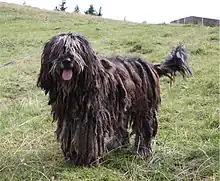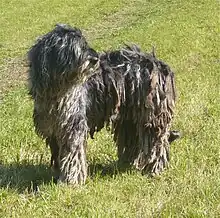| Bergamasco Shepherd | |||||||||||||||||||||||||
|---|---|---|---|---|---|---|---|---|---|---|---|---|---|---|---|---|---|---|---|---|---|---|---|---|---|
 | |||||||||||||||||||||||||
| Other names |
| ||||||||||||||||||||||||
| Origin | Italy | ||||||||||||||||||||||||
| |||||||||||||||||||||||||
| |||||||||||||||||||||||||
| Dog (domestic dog) | |||||||||||||||||||||||||
The Bergamasco Shepherd, Italian: Cane da Pastore Bergamasco, is an Italian breed of sheepdog. It originated in the Alpi e Prealpi Bergamasche, where it was used as a herding dog for both sheep and cattle.
History
The origins of the Pastore Bergamasco are unknown.[2] A genetic study in 2018 found evidence of haplotypes shared with other European breeds including the Berger Picard, the Bernese Mountain Dog and the Briard.[3]
A dog of this type was exhibited at the first Italian dog show in Milan in 1881.[2] The first registration of the breed in the Libro Origini Italiano, the Italian national stud-book for dogs, was in 1891.[4] A breed association, now called the Associazione Amatori del Cane da Pastore Bergamasco, was established in 1949.[2] The breed was recognised by the Ente Nazionale della Cinofilia Italiana in 1956,[2] and was definitively accepted by the Fédération Cynologique Internationale in the same year.[5]
In the nine years from 2011 to 2019, annual registrations in Italy averaged 97 per year, with a maximum of 149 and a minimum of 48.[4]
Characteristics

The Bergamasco is a robust and rustic dog of medium size, solidly built and well proportioned. It is roughly square in outline when seen from the side – the length of the body is approximately equal to the height at the withers.[1][6] Dogs stand some 58–62 cm at the withers, and weigh about 32–38 kg; bitches are about 4 cm smaller, and weigh on average 6 kg less.[1][7]
It is characterised by a long thick coat which covers every part of the dog. Particularly on the hind part of the body, the coat forms long matted locks which provide good protection from bad weather; on the fore part of the body the hair is coarse and forms wavy ringlets like those of a goat, while the hair on the head is rather finer.[7] The coat may be of any shade of grey, from very pale to matt black; some tinges of isabella or fulvous colour are allowable.[7]
References
- 1 2 3 4 5 6 FCI-Standard N° 194: Cane da Pastore Bergamasco (Bergamasco Shepherd Dog). Fédération Cynologique Internationale. Accessed February 2021.
- 1 2 3 4 Associazione Amatori del Cane da Pastore Bergamasco: Storia (in Italian). Ente Nazionale della Cinofilia Italiana. Archived 11 August 2020.
- ↑ Andrea Talenti, Dayna L. Dreger, Stefano Frattini, Michele Polli, Stefano Marelli, Alexander C. Harris, Luigi Liotta, Raffaella Cocco, Andrew N. Hogan, Daniele Bigi, Romolo Caniglia, Heidi G. Parker, Giulio Pagnacco, Elaine A. Ostrander, Paola Crepaldi (2018). Studies of modern Italian dog populations reveal multiple patterns for domestic breed evolution. Ecology and Evolution. 8: 2911–2925. doi:10.1002/ece3.3842.
- 1 2 Cane da Pastore Bergamasco (in Italian). Ente Nazionale della Cinofilia Italiana. Accessed February 2021.
- ↑ FCI breeds nomenclature: Cane da Pastore Bergamasco (194). Fédération Cynologique Internationale. Accessed February 2021.
- ↑ Descrizione: Cane da Pastore Bergamasco (in Italian). Ente Nazionale della Cinofilia Italiana. Archived 7 July 2014.
- 1 2 3 FCI Standard N° 194: Cane da Pastore Bergamasco (in Italian). Ente Nazionale della Cinofilia Italiana. Accessed February 2021.